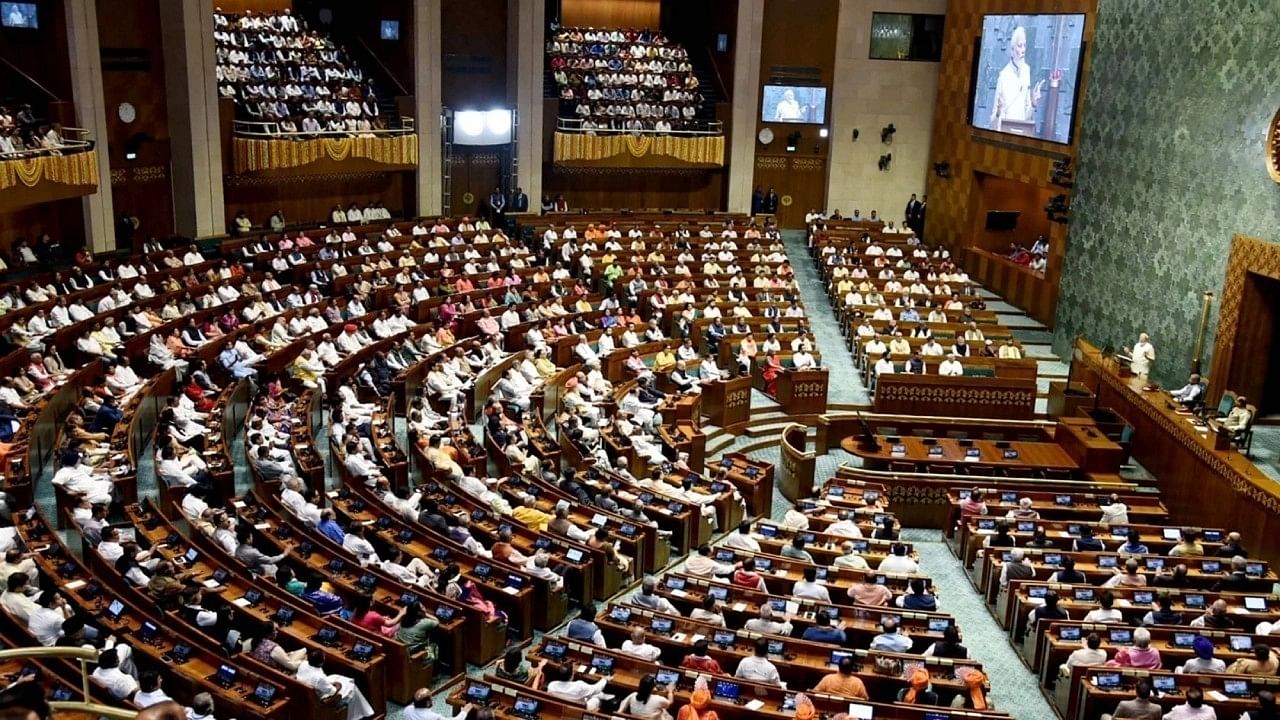
Representative image of a Lok Sabha session in process at the new Parliament building in New Delhi.
Credit: PIB Photo
As the newly elected representatives for the 18th Lok Sabha prepare to join Parliament, it may be appropriate to reflect on the performance of the previous MPs from Karnataka and flag the lessons they hold for us. The most egregious failure of the previous MPs (17th Lok Sabha) from Karnataka, where 25 out of 28 were from the BJP, is the extent to which they reneged on their responsibilities to uphold and promote the state’s interests.
Even as the BJP defied the cooperative federalism enshrined in the Constitution and imposed several draconian Acts, Karnataka’s BJP MPs either remained silent about such trends or sought to openly implement various RSS-BJP programmes in their constituencies. Worse yet, they failed to support Karnataka’s rights to fair allocation of GST funds and key programmes such as the MNREGS and drought relief.
Will the new MPs continue to kowtow to the dictates of increasing centralisation, or will they boldly champion the interests of Karnataka? Will the new MPs — including three former chief ministers H D Kumaraswamy, Jagadish Shettar and Basavaraj Bommai — advocate for Karnataka’s rights to formulate its own laws regarding agriculture (a state subject) and land? Or, will Kumaraswamy, in his new avatar as Union Minister, privilege the unregulated expansion of extractive industries over the rights and interests of farmers?
At the constituency level, most MPs of the 17th Lok Sabha had asserted their contribution as linked to promoting large-scale infrastructure projects such as airports, highways, high-speed trains etc., over that of providing basic infrastructure such as drinking water, sanitation, health and education facilities.
Only four out of the 28 MPs took proactive and pro-people measures to address the dire food and health situation during the Covid-19 pandemic, indicating the extent to which the abandonment of emergency supervision by the MPs exacerbated distress in the state.
Despite this track record of negligence towards constituents’ interests and well-being, several senior politicians were re-elected, which is a sign of the extent to which our electoral democracy is run on balancing the power equations of caste, capital and cultural idioms.
Instead of upholding the rules of law and system functioning, elected representatives are often assessed by people based on personal access. They are deemed ‘good’ if they provide small personal favours or are socially amenable.
This approach and the failure to make access to elected representatives a part of a transparent, democratic system has meant that citizens position themselves as supplicants. They seek favours via their elected representatives instead of asserting their citizenship rights through open and reliable systems with which the elected representative should be held accountable.
The Prajwal Revanna case exemplifies this and indicates how such relationships — where elected representatives act as patrons and citizens as subjects or clients — undermine not only the democratic functioning of larger systems but also force citizens to become sacrificial victims, as seen in the Hassan case.
Contrary to the expectations that they uphold the rule of law and promote comity and harmony in society, eight BJP MPs of the previous Lok Sabha indulged in hate speech, fuelled communal tensions and made misogynistic statements. That such a politics of hate cannot go far is evident in the case of Tejaswi Surya’s declining vote share despite the fact that he was re-elected from a constituency that consists of ardent supporters of the Modi-RSS-BJP dispensation.
One hopes that this batch of MPs, comprising some seasoned politicians and seven re-elected members from the BJP, will strive to change the previous record and uphold the Constitution’s mandate of fostering fraternity among all citizens.
This batch also has five fresh, young MPs (Sunil Bose, Priyanka Jharkiholi, Yaduveer Wadiyar and Shreyas Patel) who won on the strengths of their families’ caste, wealth and social standing in specific regions. Will these young representatives champion the needs of the new generation, advocating for open opportunities, equal rights and overarching democratic cultures? Or will they reproduce the culture of privilege and domination from which they emerged?
At a time when the mixed mandate in Karnataka’s parliamentary election flags the possibility of challenging the intense saffronisation of society and state systems, we must repose on this new batch of parliamentarians a small glimmer of hope.
If C N Manjunath was elected on the basis of recognising his healing touch, then one wishes that he will rise above the cultural politics of the BJP and emerge as a representative who fosters the healing of this deeply wounded society and state. It is only through this form of rapprochement and systemic accountability of elected representatives that we can address the possibilities of authoritarianism and forge new humane relations between citizens and their elected representatives.
(The writer is a social anthropologist)